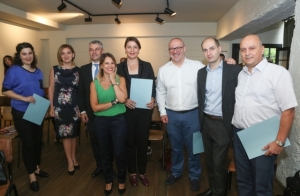Leading Georgian Arbitration Institutions Commit to Common Standards of Ethics
Four leading arbitration institutions in Georgia – the Georgian International Arbitration Center (GIAC), the Dispute Resolution Center (DRC), the Mediation and Arbitration Center of the European Business Association (EBA) and the International Arbitration under the Chamber of Commerce and Industry of the Ajara Autonomous Republic – signed a memorandum today with the Georgian Association of Arbitrators (GAA), agreeing to comply to high standards of professionalism and practice arbitration in line with the GAA Code of Ethics. This initiative was supported by the European Union and the United Nations Development Programme (UNDP) under their broader effort to increase access to justice for businesses and promote mediation and arbitration as alternative forms of dispute resolution.
“Access to independent and trusted arbitration is critical to promote the efficient resolution of commercial disputes, attract investments and create a healthy business ecosystem,” said GAA Chair Sophie Tkemaladze. “As Georgian arbitration institutions sign up for a code of ethics and disciplinary rules, they make a huge step forward, raising their professional standards and gaining credibility among both Georgian and international businesses.”
“Developing mediation and arbitration as an alternative means of dispute resolution is an essential part of the ongoing justice system reform in Georgia,” said Deputy Minister of Justice Mikheil Sarjveladze. “A code of ethics guides arbitration, ensuring its neutrality, party autonomy and procedural fairness.”
“UNDP is supporting mediation and arbitration in Georgia to expand access to justice for citizens and businesses by providing dispute resolution mechanisms that are faster and cheaper than the courts,” said UNDP Head Louisa Vinton. “Adopting a code of ethics and creating an enforcement mechanism with real teeth will help build confidence that these new mechanisms are worthy of their trust.”
The arbitrators’ Code of Ethics was developed by the Georgian Association of Arbitrators (GAA) in 2013 but lacked an enforcement mechanism up until 2018 when its Ethics Committee was established and Disciplinary Rules were introduced with EU and UNDP support. The Code provides a framework of ethical norms for arbitrators, obliging them to practice arbitration in a fair and just manner, abiding by independence, neutrality and impartiality and revealing any conflict of interest that may influence their judgement. It also sets communication rules for arbitrators and dispute parties, and requests arbitrators to avoid excessive and unnecessary expenses.
With the enforcement mechanism now in place, a violation of the Code can lead to disciplinary proceedings before the GAA’s Ethics Committee that comprises of leading practitioners in the field and can impose sanctions ranging from confidential recommendations to expulsion from the Association.
The memorandum signed today expands the powers of the GAA Code of Ethics, enabling its Ethics Committee to react to arbitration cases handled by non-GAA members.
The EU and UNDP are promoting Alternative Dispute Resolution as part of the EU’s wider programmes EU4Justice and EU4Business, contributing to justice reforms and private sector development in Georgia.












